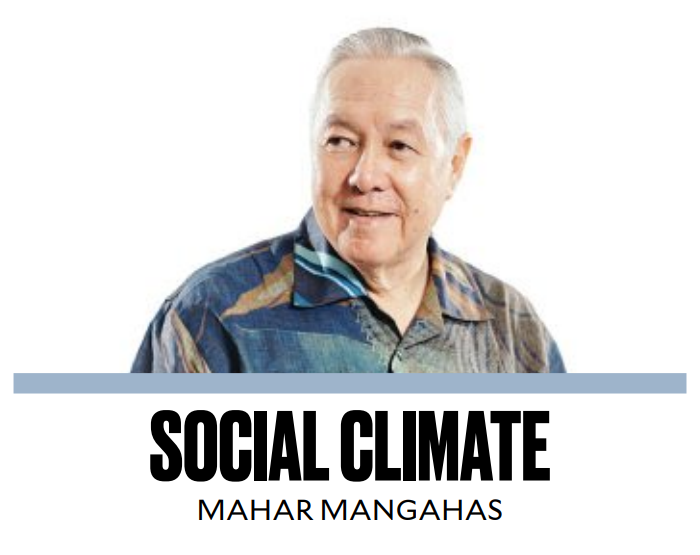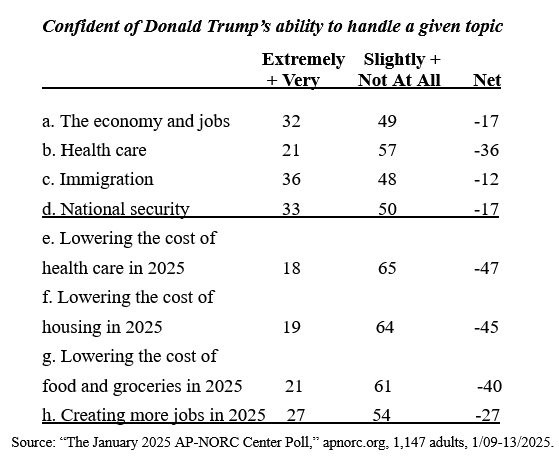Trump’s numbers are weak

Donald Trump, the newly installed president of the United States, is the second-least popular of all presidents in the first week in office, with 49.8 percent approval and 42.8 percent disapproval, or net +7.0.
This is because there was one other president less popular in his first week, namely Donald Trump himself, back in 2017, when he had 44.6 percent approval and 41.4 percent disapproval, or net +3.2.
The initial net rating of Joseph Biden was +21.8, while that of Barack Obama was +46.9. (see “Once again, Trump starts a term with a weak approval rating,” abcnews.go.com, 1/29/2025)
There are no other new presidents with single digit net scores. The latest Trump rating that I see is: approval 48.8, disapproval 44.1, net +4.7. (abcnews.go.com, 2/5/2025)
Half of all Americans expect Trump to be either a ‘poor’ or a ‘terrible’ president. Polling question: “In his second term, do you think Donald Trump will be a great, good, average, poor, or terrible president?” Results, in percentages: great 17, good 19, average 15, poor 10, terrible 39.
This is from “The January 2025 AP-NORC Center Poll” (apnorc.org), which took a national sample of 1,147 adults on 1/9-13/2025. The polling partners are the Associated Press, a media company, and the National Opinion Research Center (NORC) of the University of Chicago. (Disclosure: I have known the NORC people personally since 1990, when Social Weather Stations [SWS] joined the International Social Survey Program [ISSP] to represent the Philippines. NORC is a co-founder of ISSP; SWS has done all of the annual ISSP surveys since 1991, or 34 surveys so far.)

Neither do Americans have confidence in Trump’s crowd. From the same source, here are the net approval ratings of the following officials appointed by Trump: a. Robert F. Kennedy Jr. as secretary of the Department of Health and Human Services, -12; b. Kash Patel as Federal Bureau of Investigation director, -12; c. Tulsi Gabbard as director of national intelligence, -10; d. Pete Hegseth as secretary of defense, -16.
Polling question: “Do you think it would be a good thing, neither a good nor a bad thing, or a bad thing if the government relies on the following types of people for advice on government policy?” Net percentages of very good or somewhat good minus somewhat bad or very bad: a. billionaires, -48; b. people without any background in government, -26; c. members of the opposing party, +39 (!); d. family members of the president, -47.
Americans generally reject Trump’s handling of his pet peeve, immigration. Below are items from a different polling report, “Americans favor deporting undocumented immigrants, until they’re asked how” (axios.com, 1/19/25). The general probe asks for a Yes or a No to certain Trump proposals; summarized below is overall opinion, labeled All, and the opinions of Republicans (R) and Democrats (D) in particular.
1. “Deporting immigrants who are in the country illegally”—Yes, R/All; No, D. 2. “Using active duty military to find undocumented immigrants”—No, D/All; Yes, R. 3. “Deporting immigrants that came to the US illegally as children”—No, D/All; Yes, R. 4. “Quickly deporting detained immigrants, even if it involves separating families or sending people to countries other than their country of origin”—No, D/All; Yes, R. 5. “Using money allocated to the U.S. military to pay for deportation”—No, D/R/All. 6. “Deporting immigrants who are in the country legally”—No, D/R/All (source: a national poll of 1,025 U.S. adults, 1/10-12/2025, by Ipsos’ KnowledgePanel, a nationally representative probability sample.)
Judging from the above, what do you suppose forthcoming polls about Trump’s imposing new tariffs, weakening the United States Agency for International Development, making life hard for LGBTQ+, and “taking over” the Gaza strip will find? Abangan.
—————-
Contact: mahar.mangahas@sws.org.ph
Dr Mahar Mangahas is a multi-awarded scholar for his pioneering work in public opinion research in the Philippines and in South East Asia. He founded the now familiar entity, “Social Weather Stations” (SWS) which has been doing public opinion research since 1985 and which has become increasingly influential, nay indispensable, in the conduct of Philippine political life and policy. SWS has been serving the country and policymakers as an independent and timely source of pertinent and credible data on Philippine economic, social and political landscape.





















